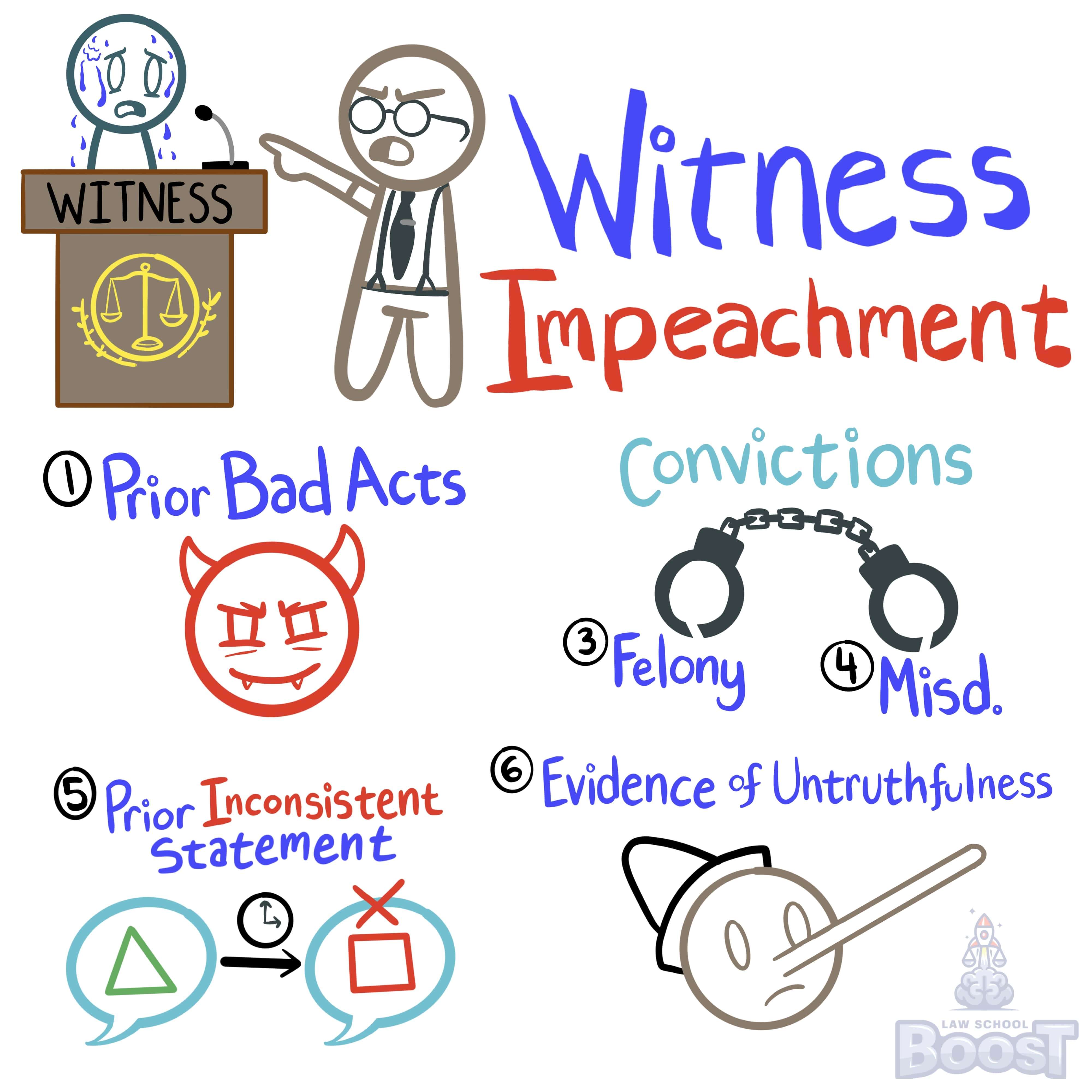🦅
Federal Evidence • Witness Impeachment
EVID#096
Legal Definition
A witness can be impeached by prior inconsistent statements, which are limited to impeachment purposes, unless they were made under oath in a prior legal proceeding).
Plain English Explanation
If a witness has said something different before about the same thing they're talking about in court, this could mean they're not being honest now. The law allows lawyers to use these past statements to show that the witness might not be reliable. However, these statements are mainly used to question the witness's trustworthiness. They can only be treated as true facts if they were made under oath in a previous legal proceeding. This rule is there to make sure witnesses stick to the truth and helps the judge or jury decide who to believe.
Hypothetical
Hypo 1: Bob is on trial for a car accident involving Sam. In court, Bob claims he had the green light. However, a statement he made right after the accident to a police officer, where he admitted he ran a red light, is brought up. Result: Bob's previous admission can be used to impeach his credibility in court, showing he might not be telling the truth now.
Hypo 2: During a trial, Sam testifies he never met Bob. However, an email is presented where Sam had written about meeting Bob. Result: The email is used to challenge Sam's reliability as a witness since he previously acknowledged knowing Bob, contradicting his current testimony.
Hypo 3: In court, Bob denies owning a specific piece of jewelry that was stolen from Sam. However, a sworn deposition from a previous lawsuit shows Bob admitting to owning that exact jewelry. Result: Since the deposition was under oath, it can be used not only to question Bob's trustworthiness but also as evidence that he did own the jewelry.
Hypo 4: Sam testifies in court that he never received a warning from Bob. However, a recording of a phone call is presented where Sam acknowledges receiving a warning from Bob. Result: The phone call can be used to impeach Sam's testimony, showing that his statement in court might not be truthful.
Hypo 2: During a trial, Sam testifies he never met Bob. However, an email is presented where Sam had written about meeting Bob. Result: The email is used to challenge Sam's reliability as a witness since he previously acknowledged knowing Bob, contradicting his current testimony.
Hypo 3: In court, Bob denies owning a specific piece of jewelry that was stolen from Sam. However, a sworn deposition from a previous lawsuit shows Bob admitting to owning that exact jewelry. Result: Since the deposition was under oath, it can be used not only to question Bob's trustworthiness but also as evidence that he did own the jewelry.
Hypo 4: Sam testifies in court that he never received a warning from Bob. However, a recording of a phone call is presented where Sam acknowledges receiving a warning from Bob. Result: The phone call can be used to impeach Sam's testimony, showing that his statement in court might not be truthful.
Visual Aids

Related Concepts
How may a witness be <impeached>?
In California, how may a witness be impeached?
When attempting to impeach a witness, how do courts handle the admissibility of evidence related to evidence of character for untruthfulness?
When attempting to impeach a witness, how do courts handle the admissibility of evidence related to felony convictions?
When attempting to impeach a witness, how do courts handle the admissibility of evidence related to misdemeanor convictions?
When attempting to impeach a witness, how do courts handle the admissibility of evidence related to specific instances of conduct and prior bad acts?
When attempting to impeach a witness in California, how do courts handle the admissibility of evidence related to felony convictions?
When attempting to impeach a witness in California, how do courts handle the admissibility of evidence related to misdemeanor convictions?
When attempting to impeach a witness in California, how do courts handle the admissibility of evidence related to prior inconsistent statements?
When attempting to impeach a witness in California, how do courts handle the admissibility of evidence related to specific instances of conduct and prior bad acts?
When attempting to impeach a witness in California, how do courts handle the admissibility of evidence under Proposition 8?


